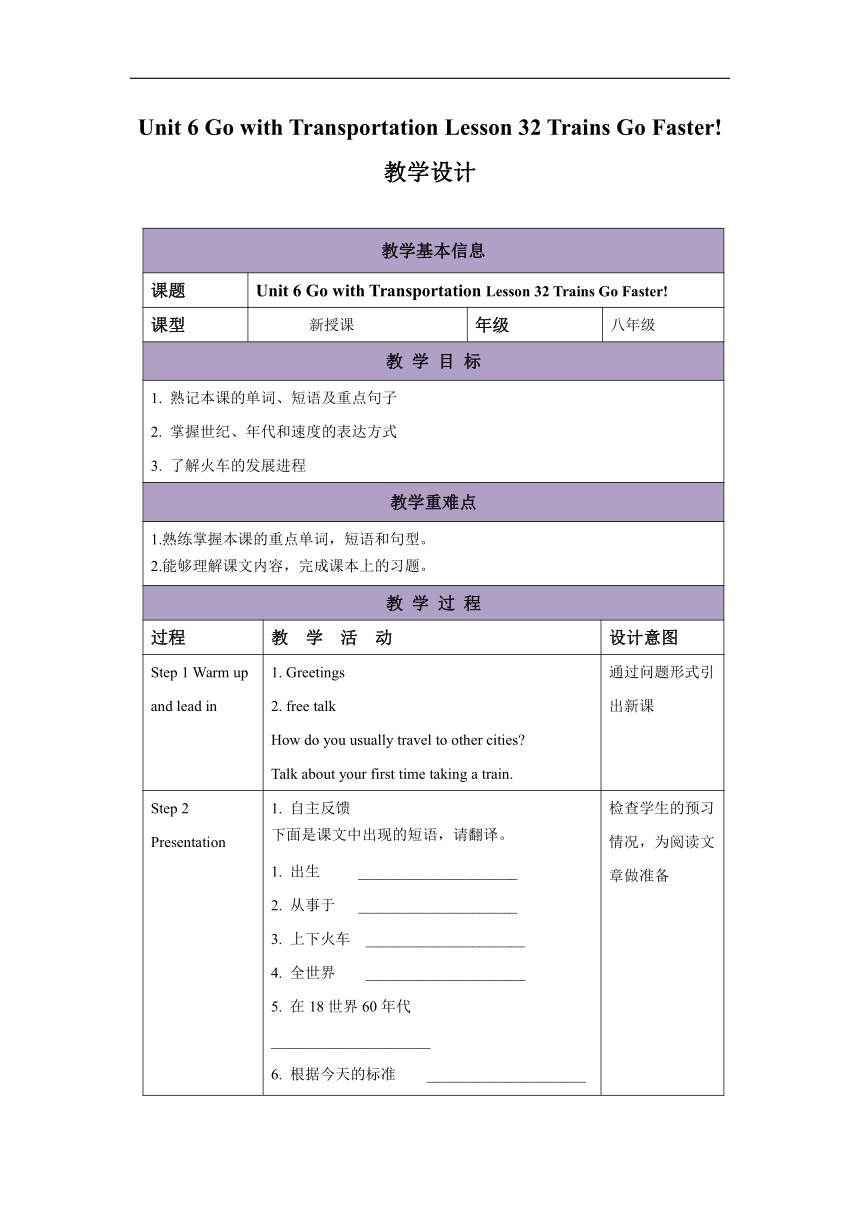
Unit 6 Go with Transportation Lesson 32 Trains Go Faster! 教学设计 教学基本信息 课题 Unit 6 Go with Transportation Lesson 32 Trains Go Faster! 课型 新授课 年级 八年级 教 学 目 标 1. 熟记本课的单词、短语及重点句子 2. 掌握世纪、年代和速度的表达方式 3. 了解火车的发展进程 教学重难点 1.熟练掌握本课的重点单词,短语和句型。 2.能够理解课文内容,完成课本上的习题。 教 学 过 程 过程 教 学 活 动 设计意图 Step 1 Warm up and lead in 1. Greetings 2. free talk How do you usually travel to other cities Talk about your first time taking a train. 通过问题形式引出新课 Step 2 Presentation 1. 自主反馈 下面是课文中出现的短语,请翻译。 1. 出生 _____ 2. 从事于 _____ 3. 上下火车 _____ 4. 全世界 _____ 5. 在18世界60年代 _____ 6. 根据今天的标准 _____ 7. 把……和……结合起来 _____ 8. 50年后 _____ 9. 以……的高速 _____ 10. 现在的高速列车 _____ 2.Teach the text 1)播放录音学生跟读回答问题 2)知识讲解 (1) In the 1700s, many scientists worked on steam engines. 在18世纪,很多科学家致力于蒸汽机(的研制)。 ①a). in the +年代+s “在……世纪/年代” 如: in the 1760s “在18世纪60年代” About _____ of the workers in the factory were born in the _____. A. two-thirds; 1970 B. two-thirds; 1970s C. two-third; 1970 D. two-third; 1970s ② work on “从事,致力于……;忙于……”,后接名词,代词或动名词形式。 如: e.g. I’m sorry I can’t go out with you. I’m working on my homework. 很抱歉我不能和你出去了,我在做作业。 (2) In the 1760s, a scientist in England found a way to put steam engines and wheels together.在18世纪60年代, 一位英国的科学家发现了一种把蒸汽机和轮子组合在 一起的方法。 ①find动词,“发现,找到”,其过去式和过去分词为found。 e.g. I can’t find my keys. 我找不到钥匙。 【拓展】 find out “查明,弄清楚” 你能查清楚会议什么时候开吗? Can you find out what time the meeting starts found “ 创立,创建 ”,过去式和过去分词均为founded。 他去年创办了一个俱乐部。 He founded a club last year. ②wheel可数名词, “车轮,轮子;(汽车、轮船的)方向盘。 Bikes have two wheels.自行车有两个轮子。 【拓展】 与wheel有关的短语: at the wheel 掌管;控制 take the wheel开车 (3) In 1804, the first train engine was born in England. 在1804年,第一台机车在英国诞生了。 be born “出生,产生,形成” born 是动词bear的过去分词,be动词常用was或were.当表示出生地点或日期时,后面可以接介词in, at或on构成的介词短语。 例:他生于石家庄。 He was born _____ Shijiazhuang. 我出生于1999年7月25日。 I was born _____ July 25, 1999. 【拓展】 be born of “出身于” 例:她出身于工人家庭。 She was born of a worker’s family. (4)People built many train stations to help passengers get on and off the trains easily. 人们建了很多火车站来帮助乘客很容易地上下火车。 a). get on/ off意为“上、下(车、船等) 例: I saw him when he got on the bus. 当他上公共汽车时,我看见了他。 When you get off the boat, please call me. 你下船时,请给我打电话。 注意: get into意为“上(出租车/小汽车); get out of 意为“下(出租车/小汽车) ②easily副词,意为“容易地“,是easy的副词形式。在句中修饰实义动词。 I can finish my homework easily. (5)Early trains were sl ... ...
~~ 您好,已阅读到文档的结尾了 ~~